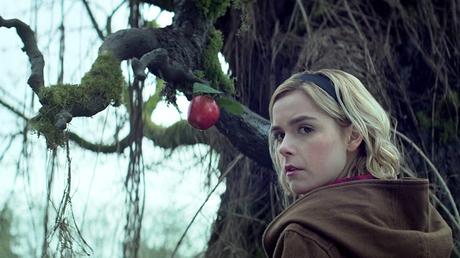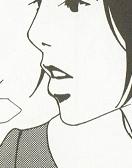
Sabrina: I want freedom and power. Prudence: He will never give you that. The Dark Lord. The thought of you, of any of us, having both terrifies him.Chilling Adventures of Sabrina, starring Kiernan Shipka in the titular role, is based on the same source material as the 1990s sitcom Sabrina the Teenage witch, but turns the comic books (which are set in the same universe as Archie, and therefore Riverdale) into an entirely different beast than what preceded it. It is a genre-switched adaptation, not unlike Riverdale an ambitious riff on the idea of making something for people who may have watched or read previous versions in their childhoods and early teens but are now ready to for a darker reinterpretation. "Darker", in both cases, doesn't just mean literally more brutal and erotic than something made for children could ever be, but also more psychologically twisted, and much more interested in class and power structures than could be easily conveyed in a half-hour long sitcom starring Melissa Joan-Hart. Since I've never had the chance to read the comic books, I'm not sure if Chilling Adventures of Sabrina takes kernels of potential and develops them eloquently into what they could have been without the necessary self-censorship of a younger audience or an idea of mass-appeal - much like Battlestar Galactica, years ago, took a campy show and turned it on its feet to become much more than the original show ever was. In any case, this is what Sabrina succeeds at - being a show about gender and power and people, especially women, struggling for freedom and power in both the real and the magical realm.
Sabrina: Why is that? Prudence: He’s a man, isn’t he?
What makes this first season of the show so interesting isn't really that it tells the story of the magical realm being really a patriarchy set up in a way to specifically benefit the male leaders, as symbolised by Father Blackwood (Richard Coyle), who rewrites the rules of Satan (who appears in dream sequences, but never visibly intervenes against his representative, giving him a free reign to interpret his wishes as he requires) to lead a cushy life among his predominantly female coven. All of those things are predictable to an extent, as is the foundational crime that the coven committed against thirteen witches in the witch-hanging days of Greendale, one that comes to literally haunt them in the climax of the season. The surprise twist in Sabrina is how much the earthly realm mirrors the twisted power relations of the magical one, how much the other world open to Sabrina, since she is a half-witch who exists in both realms, is just as twisted and broken as Father Blackwood's Church of Night.
Sabrina, on the crisp of her sixteenth birthday, has to make a choice between the life she has always known - living with her Aunts Hilda (Lucy Davis) and Zelda (Miranda Otto) after the death of both her parents, going to Greendale's local highschool with her best friends, Susie (Lachlan Watson) and Roz (Jaz Sinclair), making future plans with her boyfriend Harvey (Ross Lynch) - or fulfilling her destiny, signing her name in the book of Satan, joining the Church of Night, and resuming her education in Father Blackwood's Academy of the Unseen Arts. It's a difficult decision to make, especially because her friends and boyfriend do not know that Sabrina is a witch, and she can't bring herself to tell them. The decision is made even harder when Sabrina gets a hint of how much her friends will struggle if she leaves them behind, especially Susie, who is brutally bullied for not fitting the narrow gender roles of Baxter High's social hierarchy. The situation is made worse by the fact that Baxter's principal is unwilling to help, and props up a system in which minority students suffer while the bullies, who are all on the football team, thrive. Sabrina tries to use her powers to protect her friend, but she realises that none of that - nor the foundation of WICCA, a feminist after-school club, will be sufficient to make sure that Susie and Roz are okay after she leaves.
At the same time, the world that would open to Sabrina if she signed her name is tempting because of the power it offers, but as riddled with issues as Baxter High is. Sabrina, even before setting foot in the Academy, is dream-bullied by the Weird Sisters (led by Prudence, played by Tati Gabrielle, one of the several outstanding performances), who hate her for not being a pure-blood witch. The more she gets to know the realm, the more she discovers how problematic it is, and how differently Father Blackwood is leading the Church compared to the reformist ideas that her father, who was in his position before he passed, pursued when he was trying to change the Church. Familiars are considered servants, not partners (to refute that idea, Sabrina looks for a volunteer, and finds on in Salem, who is more useful than the original Salem but also doesn't talk, in part because Cousin Ambrose fulfils some of his narrative function). It's not just the strict hierarchy, or the fact that Father Blackwood has gotten away with cheating on his wife, and fathering children outside of his marriage - it's also that he is reinstating truly troublesome rituals, such as the annual sacrifice of a willing witch, to be eaten by her fellow coven in celebration of a historical event.
Sabrina isn't just horrified by the ritual, but by the fact that her Aunt Zelda seems reluctant to condemn it as the barbaric, medieval crime that it is. This is the same Church that has condemned her cousin Ambrose to an almost century-long house arrest and is keeping her father's teachings under lock-and-key lest it should give aspiring witches and warlocks the wrong ideas about how the Church is set up. All the while, there are forces very interested in winning Sabrina over for Satan - most of all, her beloved teacher Mary, who is much changed after a whole different creature kills her and takes over her skin. She sets a complex play into motion meant to alienate Sabrina from her friends and from Harvey, one that ultimately escalates into a predictably doomed attempt to bring back Harvey's brother, dead after two of the Weird Sisters take revenge on him for being born into a family of Witch Hunters, from the dead. Predictably, what comes back from the mines isn't Harvey's brother, but an empty shell of a person, devoid of a soul, and what needs to be done to right the wrong Sabrina has committed, to balance the scales, is utterly horrible, especially for gentle Harvey.
In all of her focus on figuring out what she is meant to do, Sabrina misses out on understanding her friends' struggles - Harvey, the son of a mine owner who despises him for what he sees as weaknesses (an artistic talent, a fear of the mines, ambitions to leave Greendale), Susie who is trying to figure out who she is and stumbles over along family history of women and men who defied gender roles, and are deeply entwined in the history of Greendale, and Roz, who has inherited a genetic blindness but finds out from her grandmother that her loss of vision comes with a supernatural gift that gives her the ability to see way beyond human vision. These smaller struggles, which all come together in the climax of the season, are some of the most interesting aspects of the narrative, and seeing Harvey, Susie and Roz rise to their individual challenges without the comfort of relying on magic, or powerful aunts and cousins to help them, makes them into some of the strongest characters the show has (yes, that includes Harvey, who starts off pretty much the same way that Sabrina the Teenage Witch's Harvey does, but ends up in a much more interesting place).
The central issue of Sabrina's life and the pivotal moment, the decision between signing the book or not signing the book, is being able to make her own choices - not the choices that have been laid out for her, since she was born, when her mother and father made very opposing decisions about her fate. Sabrina wants to be able to see and judge for herself where she belongs, and for a while, she gets to have her cake and eat it too - wandering both realms, going to both schools, free to exist with humans and with witches. It's a compromise that can't last, especially because there are so many forces warring for her power (and in the end, the core evil in Sabrina, much like in Harry Potter, isn't some central villain, but the very idea that someone's fate lies in the hands of adults, who end up being utterly careless about it, setting Sabrina up for higher tasks, willing to sacrifice her, but in any case, giving her no choice in the matter). In the end, the choice she makes is based on her love for her friends and for Harvey - she signs the book, to protect Greendale and those beloved people that live in it, but the show would be less of a success, would be much less ambitious, if it didn't also hint at the seductive beauty of holding power, the same thing that drew Sabrina to believe that she could trick death on a technicality. In the end, she still wants both power and freedom, and we'll see in the show's bright future how that'll turn out for her.
In short, Chilling Adventures of Sabrina has many ideas, and executes some of them brilliantly, some of them less so, but all-in-all I have greater hopes that it will not go up into the same chaotic mess that Riverdale (which is very interested in taking cliches and twisting them, and at its most interesting when it discovers dormant beasts in princesses) imploded into since its first season.
2018, created by Roberto Aguirre-Sacasa, starring Kiernan Shipka, Jaz Sinclair, Lachlan Watson, Tati Gabrielle, Ross Lynch, Lucy Davis, Miranda Otto, Chance Perdomo, Michelle Gomez, Richard Coyle.

